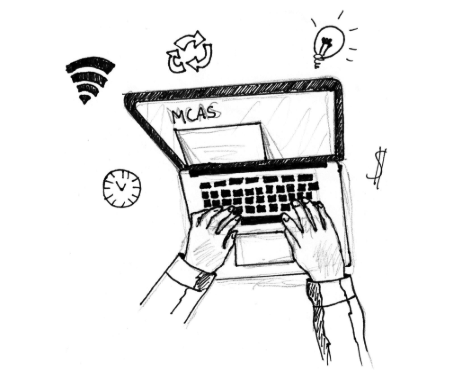MCAS turns to technology

As opposed to physical test booklets, students will now take MCAS on chromebooks in order to comply with a statewide initiative.
November 11, 2018
Students will take MCAS on computers as part of a statewide initiative starting in 2019 for sophomores and 2020 for freshmen, allowing new question types and other features to be incorporated into the test.
The ELA and math MCAS will make the transition this March and May while the biology MCAS will be rolled out slower.
Instead of the traditional booklets, the test will be administered on chromebooks through an interface which both students and teachers will have to familiarize themselves with.
“It’s a very different experience for students,” Instructional Technology Specialist Brian Calnan said. “There are different tools and reference material directly inside the program itself as opposed to separate pieces of paper or separate tools.”
The electronic version of the test will allow a student to highlight and magnify text, cross out multiple choice options, access a ruler, and view the screen in different colors if he or she is color blind. Additionally, the test will include a variety of new questions types such as drop down, ordering, and grouping.
“If it’s done well then [using the different question types] allows a little bit more diversity in how students can demonstrate what they know,” Calnan said. “But it does mean that students will have to be prepared to answer those different types of questions. That’s going to be something that students will have to get used to.”
According to assistant principal Tim McDonald, administering MCAS on computers will likely be a time-saving and cost-effective measure on account of the fact that it eliminates the need to print and ship test booklets.
“Time and money are probably the biggest [reasons why the state has shifted to electronic MCAS testing],” McDonald said.
However, administering the test electronically does leave the testing process vulnerable to computer glitches.
“There is always a challenge in a new situation,” technology systems administrator Susan Whalen said. “There is bound to be a computer that’s going to stop working or something odd, but there are procedures for that.”
In the event that a chromebook loses its internet connection, the test saves locally. If a chromebook crashes, the student’s work is stored in the cloud and can be transferred to another device. Furthermore, improvements have been made to the school’s wireless network in order to avoid any potential glitches.
“Because we’ll have so many different students on the wireless [network] with high amounts of data going through at one time, [the school has] strengthened the wireless signals [and] increased the number of access points for that to make sure that there are no glitches while students are taking the test,” Calnan said.
The electronic version of MCAS has already been rolled out in public elementary and middle schools in Northborough and Southborough, which has allowed the district to fine-tune the process.
“It’s good that we had the experience from doing it at the elementary and the middle schools, so we can apply a lot of that [experience] to the high school,” assistant technology manager for the Northborough Southborough school district TJ Carron said. “We know what to expect.”
Carron has a positive outlook on the introduction of computer-based MCAS testing.
“[Administering MCAS electronically] brings a lot more functionality to the test, and hopefully that means that the students will be more successful,” Carron said.









